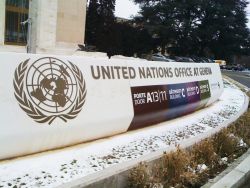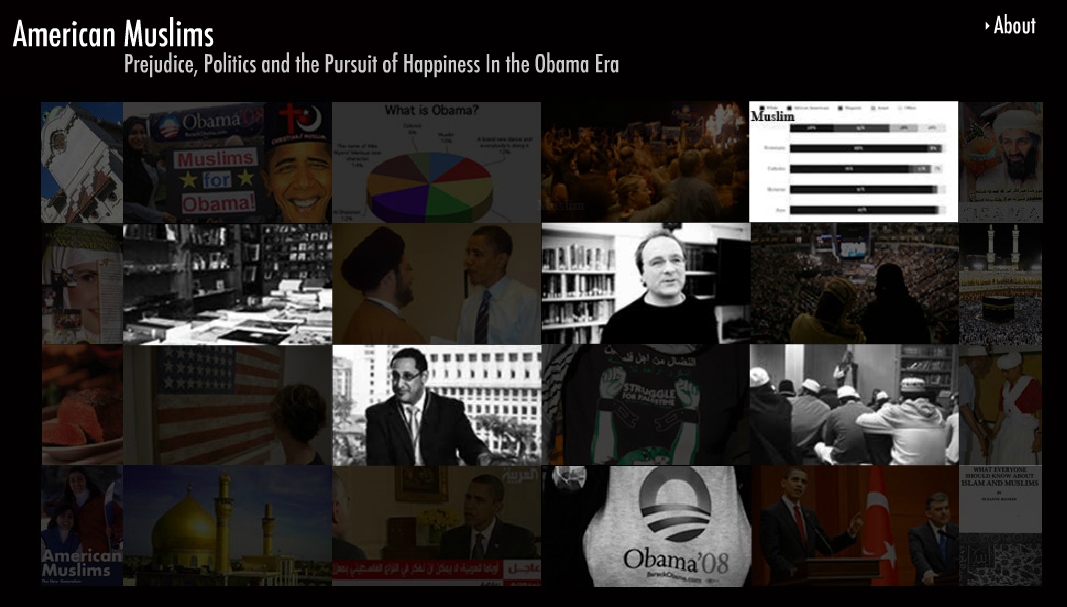Category Archives: Uncategorized
American Muslims in the Obama Era (Multimedia)
New Arsenal Emerges in Struggle over Iran’s Internet

NEW YORK, Jun 20, 2011 (IPS) – Millions of Iranians who have lived under an intense level of internet filtering and advanced monitoring systems for years may soon benefit from new technology that sidesteps the censors.
Last week, the New York Times reported that “the [Barack] Obama administration is leading a global effort to deploy ‘shadow’ Internet and mobile phone systems that dissidents can use to undermine repressive governments that seek to silence them by censoring or shutting down telecommunications networks.”
One of these projects has been dubbed “Internet in a suitcase”. According to the Times, the suitcase – financed with a two-million- dollar State Department grant – could be smuggled across the border and quickly set up to allow wireless communication over a wide area with a link to the global Internet. Continue reading New Arsenal Emerges in Struggle over Iran’s Internet
The U.S. Pressures Iran on Human Rights
Huffington Post, Posted May 20, 2011– Many may be critical of America’s human rights policies, particularly its double standards when it comes to the records of its allies in the Middle East and beyond, not to mention in Bahrain. But human rights activists and organizations have welcomed the Obama administration’s presence at the Human Rights Council in Geneva since 2009. Like it or not, “without a strong U.S. counterweight, non-democratic states such as Cuba, Algeria, China and Pakistan joined forces to blunt the Council’s work and bully other states.”
The UN will appoint a special rapporteur for Iran in the weeks to come.
In Geneva, Eileen Chamberlain Donahoe, the U.S. representative to the Council is a superstar. She is the face of U.S. human rights in town, a master of building coalitions and cooperation with different partners to make things happen. In an interview with me in Geneva, she responded to questions about the urgency and significance of establishing a monitoring mechanism for Iran, the role of politics in U.S. human rights policy, the perception of U.S. hypocrisy towards its friends and foes, her opinion about the Iranian officials’ allegations on the politicization of UN human rights mechanisms, and finally, why the U.S. is going aggressively after Iran’s human rights record. Excerpts from the interview follow: Continue reading The U.S. Pressures Iran on Human Rights
Iran Battles U.S. At UN Human Rights Council

GENEVA, Mar 21, 2011 (IPS) – Forty-nine United Nations member-states have co-sponsored a resolution asking for a special mechanism to monitor Iran’s human rights situation, which is expected to be voted later this week at the UN Human Rights Council (HRC).
Instead of responding to the criticism in the four-week long sixteenth session of the Council, the Islamic Republic of Iran’s delegation chose to bash the human rights situation in the United States, the country leading the effort to intensify pressure on Iran.
Eileen Chamberlain Donahoe, the U.S. representative to the Council, told IPS that establishing a special monitoring mechanism for Iran by the HRC is very significant. “Because the council in the past has been resistant to taking initiative on what we call country specific human rights situation,” she said.
“There is a general sense that countries are often fearful of being criticized and therefore they would protect other countries from being criticized by the council so that when it comes their turn to being criticized maybe others stick with them,” she added. Continue reading Iran Battles U.S. At UN Human Rights Council
Reading Ahmadinejad via Wikileaks: A Freedom Lover or a Two-Bit Dictator?
Huffington Post,Posted: 01/31/11 – In a recent article for the Atlantic, Middle East expert Reza Aslan writes that Mahmoud Ahmadinejad may not be the hard-line president outside observers actually thinks he is. Based on unverified WikiLeaks documents and remarks by the president himself, the author concludes that Ahmadinejad is, in fact, in favor of greater social and political freedoms and the “Persianization” of Iranian society, but is isolated among others in Iran’s current ruling establishment:
[Ahmadinejad]… is actually a reformer whose attempts to liberalize, secularize, and even “Persianize” Iran have been repeatedly stymied by the country’s more conservative factions… But if you oppose the Mullahs’ rule, yearn for greater social and political freedoms for the Iranian people, and envision an Iran that draws inspiration from the glories of its Persian past, then, believe it or not, you have more in common with Mahmoud Ahmadinejad than you might have thought.”
Here is why Aslan’s characterization of Ahmadinejad is flawed: Continue reading Reading Ahmadinejad via Wikileaks: A Freedom Lover or a Two-Bit Dictator?
Reading the Shah, and Ayatollahs in Tehran and What the U.S. Should Learn from the History
 Huffington Post– What has been the root of the U.S’. inability to develop a sustainable policy or strategy on Iran for the last 30 years? What was not learnt from the Shah’s fall in 1979 and the nature of the revolutionaries who hijacked a pro-democracy freedom movement? And what are the parallels between the Shah’s regime and the current Islamic government in Tehran?
Huffington Post– What has been the root of the U.S’. inability to develop a sustainable policy or strategy on Iran for the last 30 years? What was not learnt from the Shah’s fall in 1979 and the nature of the revolutionaries who hijacked a pro-democracy freedom movement? And what are the parallels between the Shah’s regime and the current Islamic government in Tehran?
These are the types of questions that have been raised in my extensive interview with Dr. Abbas Milani, author of the recent book, The Shah, and the Director of Iranian Studies at Stanford University in California.
While the Iranian government continues to curb social and political freedom in Iran, particularly after the post-presidential unrests which resulted in killing of dozens and arresting thousands of people, the author of a recent book, The Shah, provides a comprehensive image of parallels that contributed to the fall of the Shah and is now being perpetuated by the Islamists in Tehran.
A Portrait of Iran’s Shah, in Shades of Grey
SAN FRANCISCO, California, Jan 17, 2011 (IPS) – In “The Shah”, a prominent Iranian author and scholar at Stanford University in the United States offers new insights into Iran’s modern history, including the 1953 coup, the revolution a quarter century later, and the current repressive political situation.
“If you understand why the shah of Iran fell in 1979, we understand why the Iranian government is unstable today and based on that, predict what the future of the country will be,” Abbas Milani told IPS.
Drawing on more than 400 interviews and newly released documents by the U.S. and British embassies, “The Shah” traces the rise and fall of Mohammad Reza Shah Pahlavi, who died less than a year after his ouster. Continue reading A Portrait of Iran’s Shah, in Shades of Grey
Iranian Royal Family’s Suicide Tragedy
The Daily Beast- The shah of Iran’s son took his life Tuesday, a decade after his sister died from an overdose. Omid Memarian and Roja Heydarpour on the family heartbreak and what it means for Iran. Plus, Stephen Kinzer reports on the death of the prince.
There is nothing worse for a mother than the death of a child, except, perhaps, the death of two children who took their own lives. That is what the former queen of Iran must endure now that her son, Ali-Reza Pahlavi, 44, was found dead in his home in Boston from a gunshot wound he inflicted on himself early Tuesday morning.
It isn’t the first time Farah Pahlavi has had to grieve a child who committed suicide. Just 10 years ago, former Princess Leila Pahlavi, whose young daughter suffered from anorexia and depression, took a lethal cocktail of cocaine and barbiturates, and died in her sleep at 31. Continue reading Iranian Royal Family’s Suicide Tragedy
Mahmoud Ahmadinejad’s Brutal Artist Crackdown
The Daily Beast. December 25, 2010- The harsh sentencing of a world-renowned director prompted protests from Martin Scorsese and other artists this week. Omid Memarian on escalating repression in Iran.
When world-renowned filmmaker Jafar Panahi was sentenced to six years in prison earlier this week, the verdict reverberated both inside and outside Iran.
Not only did authorities in Tehran hand down an exceptionally harsh sentence, they also decreed that the 50-year-old Panahi will be banned from filmmaking, screenwriting and traveling abroad for the next 20 years. According to his relatives, Panahi has also been banned from talking to the media.
Along with Panahi, Muhammad Rasoulof, another filmmaker involved with Panahi’s movie, was also sentenced to six years in prison. Continue reading Mahmoud Ahmadinejad’s Brutal Artist Crackdown

